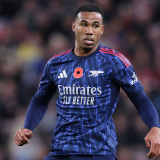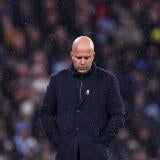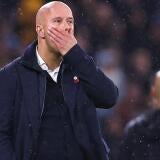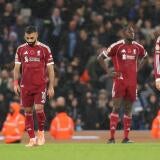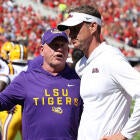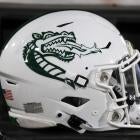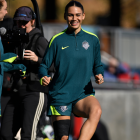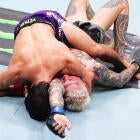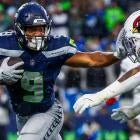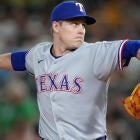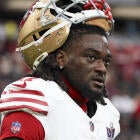Can Thomas Frank learn from Mikel Arteta's Arsenal playbook to revive Tottenham for North London Derby?
One of England's biggest rivalries writes its next chapter on Sunday
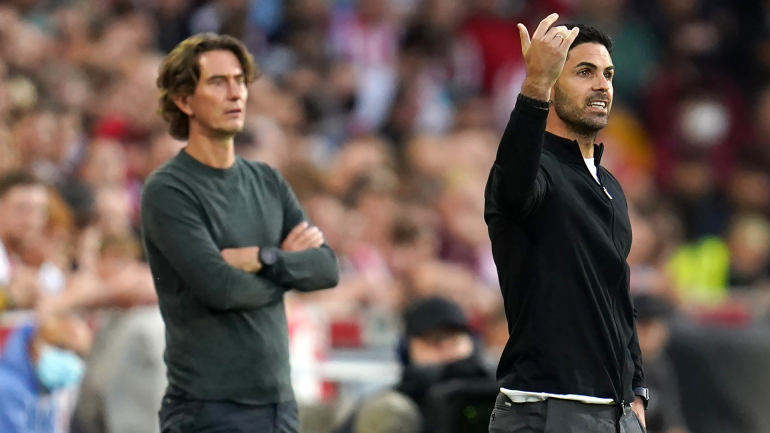
Since the moment it became apparent that Arsenal were a serious title contender, there has been a widespread point of reference every time most elite English sides have parted ways with their managers. They need their Mikel Arteta. What the club requires is someone who can with clear eyes diagnose the problems of the past and imbue his squad with the qualities to compete with the two other teams who don't need to think about hiring an Arteta of their own: Manchester City and Liverpool.
Sir Jim Ratcliffe has publicly invoked the promise of an Artetian revolution in calling for patience with Ruben Amorim at Manchester United. He might feel that that analogy has been vindicated of late.
If anyone knows the power of giving the keys to Arteta, though, it is not the Manchester United minority owner but the new CEO at Tottenham. Vinai Venkatesham is understood to have been a leading advocate for the Spaniard, then a year into his role as Pep Guardiola's assistant, on Arsene Wenger's departure in 2018. He knows only too well the transformative impact the right manager can have on a club.
Did he appoint another one when, several months before his power base was enhanced through Daniel Levy's shock exit, he plucked Thomas Frank from Brentford? In pure footballing terms, there are at least signs that the Spurs manager is applying tricks in the Arteta playbook.
None have been more obvious, nor necessary, than the tidying up of the defense. To an even more pronounced extent than the Arsenal Unai Emery left behind, Tottenham were a liability without the ball. There were injury issues at play in the 22 loss, 68 conceded Premier League season but by the end of Ange Postecoglou's two year tenure they seemed to be as much a feature of the system as a bug in it. If Spurs kept pushing their full backs infield and asking Micky van de Ven's hamstrings to hold out as he and Cristian Romero defend half a pitch, they were in for another trying season.
Much like Arteta before him and indeed another Basque coach in Bayer Leverkusen's Xabi Alonso, Frank has set about fixing the structure before adding any embellishments. Take his glowing assessment of an anodyne performance in beating Villarreal 1-0 at the start of the Champions League back in September, "our foundation is strong," he said, calling for patience on the emergence of an attacking structure that is still some way from complete.
At least the pivot to defense is working. Even after a disappointing return of one point against Chelsea and Manchester United, Spurs are conceding fewer than a goal per game. They've shaved about 15% off the number of shots they're allowing, roughly the same from their non-penalty expected goals (npxG) against. Spurs still sit 16th in the league for npxG allowed this season but 11 games in they're not a million miles away from a league average backline. That is meaningful progress from last year's relegation level defensive metrics.
Like Arteta, who did not lose a road game in any competition between his December appointment and the COVID-19 pause in football, Frank has designed a team that travels well. There is an unsustainable level of heat in 12 away goals from less than six xG but his team keep it tight and will back themselves to do the same at the Emirates Stadium, a ground they have not won a league match at since 2010.
Then again both Arteta and Frank are united by a sense that their early months make for an altogether weirder one than just defensive improvement. For both managers to imbue their teams with solidity the attack has required a borderline nerfing, one all the more profound for the team that doesn't have Pierre-Emerick Aubameyang and Mesut Ozil. That aforementioned heater in front of goal on the road is not offset at home and Tottenham's 19 Premier League goals have come from 11.12 npxG (16th in the league) and 107 shots (18th and over 50 fewer than Arsenal). Van de Ven ranks second for top flight xG, Joao Palhinha third for shots. A midfield big on ball-winning and youthful industry, light on guile, is struggling to do more than just chuck the ball to Mohamed Kudus and see what happens next.
The attacking nadir came in the loss to Chelsea where they registered just 0.12 xG, all three of their shots coming from Kudus. In the way that the insipid pursuit of parity drew the air out of the Tottenham Hotspur Stadium, it had the feel of a game plucked from the COVID-ball void. Arteta coached enough of them that there were legitimate questions over whether he could actually coach a functioning attack.
That he answered them doesn't mean that Frank is guaranteed to do the same. It is fair to point out that he is an altogether more experienced coach than his Arsenal counterpart was, one who has coached attacking improvement out of a squad when given time. When Brentford came up to the top flight they were averaging 1.1 xG per game. In his last two years they were hovering at around 1.5. That was achieved without vast expenditure, a team that hovered above the bottom three in terms of wage expenditure delivering top 10 attacking numbers. Given Tottenham similarly aspire for big six contention with big eight salaries, it is easy to make the case for giving Frank time.
Then again, there are at least three factors that explain why Frank's recovery job is even harder than the man who will welcome him to the Emirates on Sunday. On the most basic terms, he didn't arrive in north London with the inherent understanding of what was wrong that Arteta had in the winter of 2019. It might have been three and a half years since the then club captain had left but the defining problem of that club at that time was how little had changed in the intervening period (and a half decade beforehand). Arteta knew the club intimately and when he warned "the tree is going to shake" you sensed a man who knew exactly what branches were going to break loose.
Frank can't have that knowledge. Nor can he be certain that he has a youth prospect in his ranks as transformative as Bukayo Saka was for Arsenal, or William Saliba and to a lesser extent Gabriel Martinelli. That is not to say that Tottenham aren't blessed with plenty of talent in its first flourishings, their average XI is only older than Chelsea and Sunderland. It will, however, only become apparent several years from now whether Lucas Bergvall, Mathys Tel and Xavi Simons can be top players on championship contenders. The early signs are probably not.
More profoundly even than those factors, Arteta was the beneficiary of a level of space and quiet that no other elite level Premier League manager will receive in the next generation. The pandemic brought all sorts of complications for football coaches, but in this one particular case it afforded Arsenal space and time to bottom out. When fan frustration was at its most intense during the disastrous run of results in late 2020, sources within the club could dismiss questions over their manager's future as "noise." Very few things tend to be more impactful for the decision makers at top clubs than the vibe at a stadium. When that goes the manager soon follows. Empty seats at the Emirates had done for Unai Emery, empty seats were the new normal a year later.
It can be very hard to keep a crowd onside when they are not liking what they are seeing. Ange Postecoglou just about managed it, but to be a more effective proposition Frank has to be less daring. When caution delivers results fine, but the frustration emanating from the South Stand in the direction of the Dane after that loss to Chelsea are not the kind that seem sustainable. Spurs were still third in the table come the final whistle and yet questions were being asked as to whether Frank was the next Nuno Espirito Santo. He isn't and the early signs are that this is a team with stabilizing foundations even if its final structure looks a long way away.
To get the time he will need, games like Sunday's matter above all others. These are the occasions to galvanize a fanbase. Think what Arsenal's first post-lockdown derby win did for Arteta's project, the obliteration of their rivals serving as a promise of more good times to come. Achieve something similar this weekend and Frank's rebuild will already look better placed.
Viewing information
- Date: Sunday, Nov. 23 | Time: 11:30 a.m. ET
- Location: Emirates Stadium -- London
- Live stream: Peacock
Predicted lineups
Arsenal XI: David Raya; Jurrien Timber, William Saliba, Piero Hincapie, Riccardo Calafiori; Martin Zubimendi, Declan Rice; Bukayo Saka, Eberechi Eze, Leandro Trossard; Mikel Merino
Tottenham XI: Guglielmo Vicario; Pedro Porro, Cristian Romero, Micky van de Ven, Destiny Udogie; Rodrigo Bentancur, Joao Palhinha, Pape Matar Sarr; Mohamed Kudus, Richarlison, Wilson Odobert

